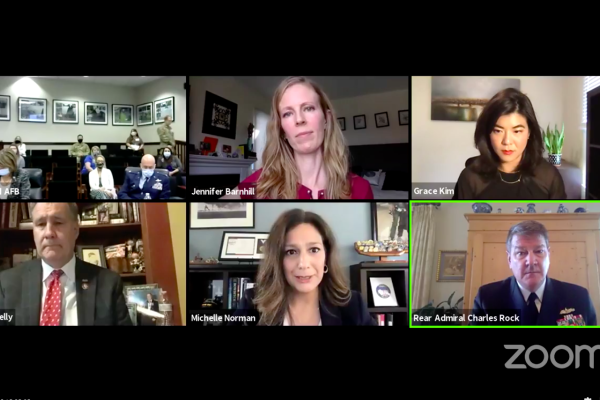
“To these incredible women I want to thank you for your passion, your commitment. You are clearly women of action that are seeking solutions,” said Representative Cathy McMorris Rodgers, after Partners in PROMISE presented on special education. “We want to keep this going on Capitol Hill.”
The Special Education Panel
Partners in PROMISE was joined by Navy Rear Admiral Charles Rock who shared details about the Navy’s upcoming pilot program that will help support Navy families by providing special education attorneys and advocates in both San Diego and the Hampton Roads area.







The event was jam packed with information. The earlier part of the program was covered on CSPAN:
This CSPAN segment featured MFRC co-chairs Rep. Cathy McMorris Rodgers (WA-05) and Rep. Sanford Bishop Jr. (GA-02) with Keynote Speaker Secretary of Defense Mark Esper.
The best part of the introductory program was when Under Secretary of Defense for Personnel and Readiness Matthew Donovan fielded some tough questions from military families.
The first question was: “The February congressional hearing on EFMP highlights significant issues impacting military families including multiple GAO reports, the issues have been systematic for a number of years, what is the Department of Defense and the Office of Special Needs doing to fix the programs across the services?”
Donovan’s response:
“Well, as I mentioned, we are sort of relocating everything in one place on our Military OneSource website and application, that’s one thing. Some of the challenges that we see are when people move from one location to another, they end up taking a long time for referral medical for special needs family member. We are making changes in Tricare where if you pass between regions of Tricare regions that your referrals follow you now and we will be implementing that over the next couple of months. We also are taking EFMP, our special EFMP programs and making sure that the losing installation has a warm handoff with the gaining installation and by warm handoff that means direct contact between the case workers so that they are fully aware and appraised of the situation of the family member of the other location and finally one of the things that we are doing is making sure that we have standardized processes and forms between the services, each service runs EFMP program differently. We are ensuring that we get standardized processes between so that we can make sure that — that a service member moving from one location that’s run by one service going to another location that’s run by another location, for example, joint bases, that’s a seamless process for them when they transfer across. One of the advantages of our consolidation of our military Medical Treatment Facilities under the Defense Health Agency helps us with that because then we have centralized control over those EFMP workers that work in the EFMP program.”
Missed the Summit?
No problem! The complete recording can be viewed here:
Education – 1:03 – 1:32
Special Education – 1:33 – 2:01
EFMP – 2:02 – 2:30
PCSing – 2:30 – 2:57
Child Care – 3:00 – 2:28
Health Care – 3:30 – 4:00
Housing – 4:00 – 4:27
Military Spouse Employment – 4:29 – 5:00
Transition – 5:00 – 5:31
Closing – 5:31 – end






Leave a Reply